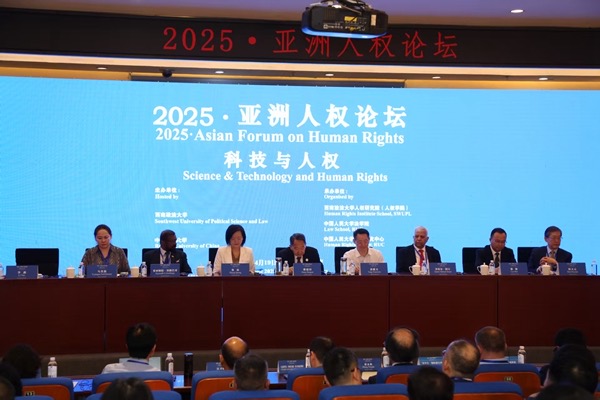
 0 Comment(s)
0 Comment(s) Print
Print E-mail China.org.cn, April 20, 2025
E-mail China.org.cn, April 20, 2025
The 2025 Asian Forum on Human Rights opens in Chongqing, southwest China, April 19, 2025. [Photo courtesy of the Human Rights Institute of the Southwest University of Political Science and Law]
The 2025 Asian Forum on Human Rights opened in Chongqing, southwest China, on April 19, bringing together scholars to explore the relationship between technological advancements and human rights.
The forum, hosted by the Southwest University of Political Science and Law (SWUPL), was organized under the theme "Science & Technology and Human Rights."
Jiang Jianguo, executive vice president of the China Society for Human Rights Studies, said at the opening ceremony that Asian countries' shared history, development realities and cultural traditions provide a foundation for human rights discussions. He emphasized continued efforts to build a community with a shared future for mankind, placing human survival and development at the center of technological innovation.
He urged greater application of technological advances in climate, food security and health care, ensuring that innovation benefits all of humanity.
SWUPL President Lin Wei, who also serves as dean of its Human Rights Institute, spoke about how technology redefines the human experience. Lin said that if human rights are understood as "the conditions that make one human," then technology is significantly expanding those conditions.
However, Lin warned that technological innovation poses new challenges to human rights protection. He highlighted emerging technologies such as gene editing and brain-computer interfaces, which, if misused, could create a "biological class divide," undermining equality and human dignity.
Lin stressed the need to harmonize technological progress with human rights, affirming that the non-transferable bottom line of human values must be upheld to ensure technology liberates humanity rather than dehumanizes it.
In his keynote address, Jayanath Colombage, director general of the Institute of National Security Studies of Sri Lanka, discussed artificial intelligence's influence on human rights, particularly autonomous weapon systems.
Colombage expressed concerns about the risks of autonomous weapon systems, which could lead to wrongful killings and indiscriminate attacks, threatening the fundamental right to life. He stressed that without the right to life, no other rights can be enjoyed.
He called for international governance and regulation to establish legal and ethical standards for autonomous weapons deployment.
Zamir Ahmed Awan, founding chair of the Global Silk Road Research Alliance think tank, examined the relationship between technological competition and justice.
Awan said access to advanced technologies is a key component of human rights and criticized the United States for limiting opportunities for international students. He condemned the U.S. government's recent cancellation of visas or legal status for more than 1,000 international students, calling it a human rights violation.
In contrast, Awan praised the China-proposed Belt and Road Initiative and Global Development Initiative for promoting international cooperation, sharing economic development experiences and cultivating high-tech talent through partnerships.
A key highlight of the forum was the participants' consensus that technology must be fundamentally oriented toward the protection of human rights.
Participants said Asia needs to lead regional collaboration on human rights issues in emerging technologies. They called for efforts to build an equitable and inclusive global science and technology framework that advances the fulfillment of human rights.
The forum also included three parallel sessions on emerging human rights issues in Asia, technology for good and other topics.
This year's forum builds on the inaugural Asian Forum on Human Rights held at Renmin University of China in 2022. The first forum centered on the theme of "Environment & Climate Change and Human Rights," underscoring the vital link between environmental challenges and human rights.